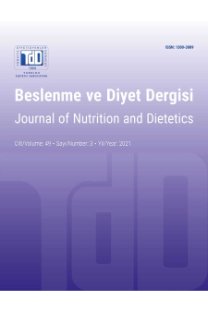Prader Willi Sendrom’lu Çocukta Tıbbi Beslenme Tedavisinin Etkinliğinin Değerlendirilmesi: Bir Olgu Sunumu
Prader Willi Sendromu (PWS), vücudun birçok bölümünü etkileyen karmaşık genetik bir hastalıktır. Bebeklik döneminde hipotoni, beslenme güçlüğü, büyüme ve gelişme geriliği, çocukluk döneminde ise hiperfaji ve obeziteyle karakterize bir hastalıktır. Görülme sıklığı dünya genelinde 10.000-30.000 doğumda birdir. Hastalığın uzun dönemdeki obezitenin neden olduğu komplikasyon (diyabet, kardiyovasküler hastalık gibi) risklerini azaltmak için, ömür boyu devam edecek tıbbi beslenme tedavisi gerekmektedir. Tıbbi beslenme tedavisi hiperfaji kaynaklı obezitenin önlenmesine yönelik olup bu dönemde çocukların büyüme ve gelişmelerinin izlemi oldukça önemlidir. Bu olgu sunumunda, PWS olan bir hastanın büyüme-gelişmesinin izlenmesinde hastalığa özgü eğrilerin kullanılmasının önemi ve tıbbi beslenme tedavisinin etkinliğinin değerlendirilmesi tartışılmıştır
A Case Report: Evaluation of the Effectiveness of Nutritional Therapy in Children with Prader Willi Syndrome
Prader Willi Syndrome (PWS) is a complex genetic illness that affects many parts of the body. In infancy, this illness is characterized by weak muscle tone (hypotonia), feeding difficulties, poor and delayed physical development. During the childhood period children develop an insatiable appetite, which leads to chronic overeating (hyperphagia) and obesity. Prevalence of PWS is estimated to be 1 in 10.000 to 30.000 children worldwide. Continuous medical nutrition treatment is necessary to prevent PWS’s long-term complications caused by obesity (such as diabetes cardiovascular disease). Medical nutrition therapy is a period that aims preventing hyperphagiainduced-obesity and requires importance and careful follow-up of children’s growth and development. In this case report, the importance of using PWS-specific curves while following up the child’s growth and development progress and efficacy of medical nutrition therapy are discussed.
___
- 1. Prader A. Ein syndrome von adipositas, kleinwuchs, kryptorchismus und oligophreniee nach myatonieartigerm zustand im Neugeborenenalter. Schweiz Med Wochenschr 1956;86:1260-1261.
- 2. Cassidy SB. Prader-Willi syndrome. J Med Genet 1997;34(11):917-923.
- 3. Zipf WB, Berntson GG. Characteristics of abnormal food-intake patterns in children with Prader-Willi syndrome and study of effects of naloxone. Am J Clin Nutr 1987;46(2):277-281.
- 4. Cassidy SB, Driscoll DJ. Prader–Willi syndrome. Eur J Hum Genet 2009;17(1):3-13.
- 5. Davies W, Phoebe MYL, Relkovic D, Wilkinson LS. Imprinted genes and neuroendocrine function. Frontiers in Neuroendocrinology 2008;29(3):413-427.
- 6. National Institutes of Health (NIH). Prader Willi Syndrome. U.S, National Library of Medicine; 2016.
- 7. Burd L, Vesely B, Martsolf J, Kerbeshian J. Prevalence study of prader‐willi syndrome in North Dakota. Am J Med Genet 1990;37(1):97-99.
- 8. Ehara H, Ohno K, Takeshita K. Frequency of the PraderWilli syndrome in the San-in district, Japan. Brain Dev 1995;17(5):324-326.
- 9. Vogels A, Ende JVD, Keymolen K, Mortier G, Devriendt K, Legius E et al. Minimum prevalence, birth incidence and cause of death for Prader–Willi syndrome in Flanders. Eur J Hum Genet 2004;12(3):238-240.
- 10. Thomson A, Glasson E, Bittles A. A long‐term population‐based clinical and morbidity review of Prader–Willi syndrome in Western Australia. J Intellect Disabil Res 2006;50(1):69-78.
- 11. Butler MG, Jennifer S, Lee J, Myers SE, Whitman BY, Gold JA, et al. Growth standards of infants with PraderWilli syndrome. Pediatrics 2011;127(4):687-695.
- 12. World Health Organization (WHO) (2006). The WHO Child Growth Standards.. Geneva. http://www.who.int/ childgrowth/standards/en/
- 13. Miller JL, Lynn CH, Driscoll DC, Goldstone AP, Gold JA, Kimonis V, et al. Nutritional phases in Prader–Willi syndrome. Am J Med Genet A 2011;155(5):1040-1049.
- 14. Miller JL, Lynn CH, Shuster J, Driscoll DJ. A reducedenergy intake, well-balanced diet improves weight control in children with Prader-Willi syndrome. J Hum Nutr Diet 2013;26(1):2-9.
- 15. Bonfig W, Dokoupil K, Schmidt H. A special, strict, fat-reduced, and carbohydrate-modified diet leads to marked weight reduction even in overweight adolescents with Prader-Willi syndrome (PWS). Sci World J 2009;9(1):934-939.
- ISSN: 1300-3089
- Yayın Aralığı: Yılda 3 Sayı
- Başlangıç: 1972
- Yayıncı: Türkiye Diyestisyenler Derneği
Sayıdaki Diğer Makaleler
SELDA ÇELİK, MERAL KELLECİ, İLHAN SATMAN
Otizmin Tedavisinde Güncel Beslenme Tedavisi Yaklaşımları
KÜBRA UÇAR, FATMA GÜLHAN SAMUR
Meme Kanseri ve Fitokimyasallar
Aylin AÇIKGÖZ, Emine Akal YILDIZ
Sağlıklı Yaşamak İçin Doğru Diyet Planı Uygulamak Bir Gerekliliktir
Non-Alkolik Yağlı Karaciğer Hastalığında İnflamatuvar Proteinler
Zeynep GÖKTA޹, Nur Bengü ERDEM
SELEN SEREL ARSLAN, FATMA ILGAZ, NUMAN DEMİR, A. Ayşe KARADUMAN
SİBEL ERDEM, HÜLYA GÖKMEN ÖZEL, ZİYNET ÇINAR, SELEN YILMAZ IŞIKHAN
HÜLYA YARDIMCI, FERAY ÇAĞIRAN YILMAZ, Furkan YOLCU, Nüket ÜNSAL, Onur AKIN
